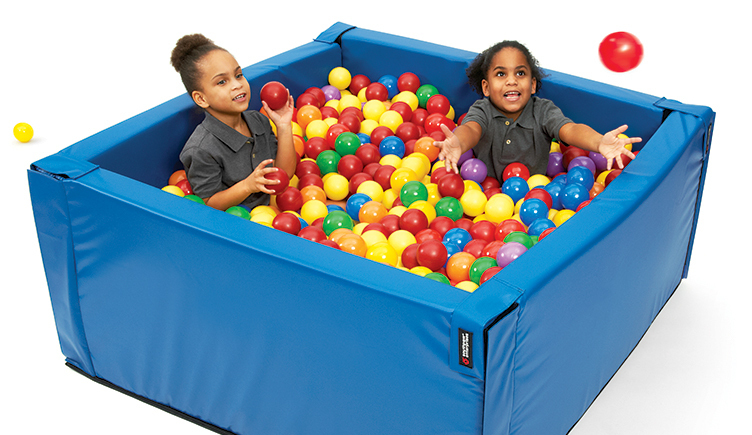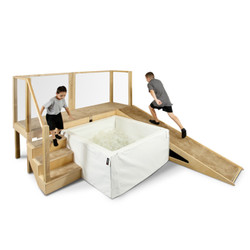Play is a pretty wild pastime, and it’s viewed in many ways. For occupational therapists working in Pediatrics, play is generally considered one of the ultimate occupations. But what does that mean? Well, through play—true play—we become ourselves. We develop language in the context of play, we learn about objects and their properties, we learn about cause and effect, and we develop a library of ideas for action. Through play we learn autonomy and social connectedness. We develop problem-solving skills and conduct science experiments and even math operations. Play is a major part of how we restore ourselves, close the stress cycle, and commune with nature and our closest humans and animals.
“We have to develop a society that understands play, and the many good things it does for children’s brains and minds,” Dr. Jaak Panksepp.
The sensory gym is, by design, a safe sandbox for whole-body, sensory-intense and poly-sensory play. It is a place where we offer our children with differences in the sensory integration process the chance to master their gross motor outputs, build capacity to modulate sensation, and discriminate and integrate sensation.
But what about pretend play? How does that fit into the sensory gym?
Pretend play, also known as imaginative play, is a crucial aspect of child development. It involves children using their imagination to create scenarios and act out different roles, perhaps with the use of props and costumes. While it may seem like just a fun activity, pretend play has numerous benefits for children’s cognitive, social and emotional development. The sociodramatic elements of pretend play offer a space for people of all ages to process experiences, figure out who we want to be, consider the perspectives of others, and “rehearse” interpersonal consequences without any real fallout.
“My childhood play took me to extremes, and all of them, I now understand, were a fun way to test the social realities into which one is born. Surely this is a most important evolutionary function of play—finding out what is fun and fair or not fair on the field of life.” Dr. Jaak Panksepp
One of the primary benefits of pretend play is that it helps children develop their creativity and imagination. By engaging in imaginative play, children are encouraged to think outside the box and come up with new ideas. This type of play also allows children to explore different scenarios and experiment with different roles, which can help them develop problem-solving skills and critical-thinking abilities.
Pretend play also offers children incredible social learning opportunities. When children engage in pretend play with others, they learn how to communicate effectively, negotiate and cooperate with others. They also learn how to take turns, share and compromise, which are essential skills for building positive relationships with others.
These skills are all part of clinical reasoning when offering sensory integration therapy, but perhaps none more so than the importance of imaginary play in the development of emotional regulation. When children engage in imaginative play, they are able to express their emotions and work through difficult situations in a safe and controlled environment. This can help children develop emotional regulation skills and build resilience.
Pretend play also fosters excitement and joy in the sensory gym. Excitement is a form of stress that can provide a motivating and safe opportunity for children to increase their “window of arousal” and remain organized through increasingly stimulating experiences.
Joy is a powerful emotion that can have a significant impact on a child’s psychological well-being. When children experience joy, they feel happy, content and fulfilled. This positive emotion can have numerous psychological benefits for children, including increased self-esteem, improved mental health and enhanced social competence.
Joy also helps tap into a child’s intrinsic motivation systems, and when play is joyful and socially connected, we are much more likely to see integration. The language center will be online, the motor center will be optimized, the willingness to do hard things will be maximized, and excitingly, the sensory integration and motor goals we have for the child and family will be met almost incidentally. Pretend play optimizes client volition and can help avoid boring sessions, power struggles and reluctance to engage in the therapeutic process. The therapist gets to experience all these benefits too!
Another psychological benefit of joy in childhood is improved mental health. When children experience joy, they are less likely to experience negative emotions, such as anxiety, depression and stress. Joyful experiences can help children build resilience and cope with difficult situations. Children who experience joy are also more likely to have positive relationships with others, which can further enhance their mental health.
“The opposite of play is not work—the opposite of play is depression.” Dr. Stuart Brown.
By providing children with opportunities to immerse themselves in imaginary play, we can help them develop into happy, healthy and well-adjusted individuals. Play—and specifically pretend play—in the sensory gym supports development of the self-organized child, one of the central tenets of sensory integration therapy as conceptualized by Ayres.



